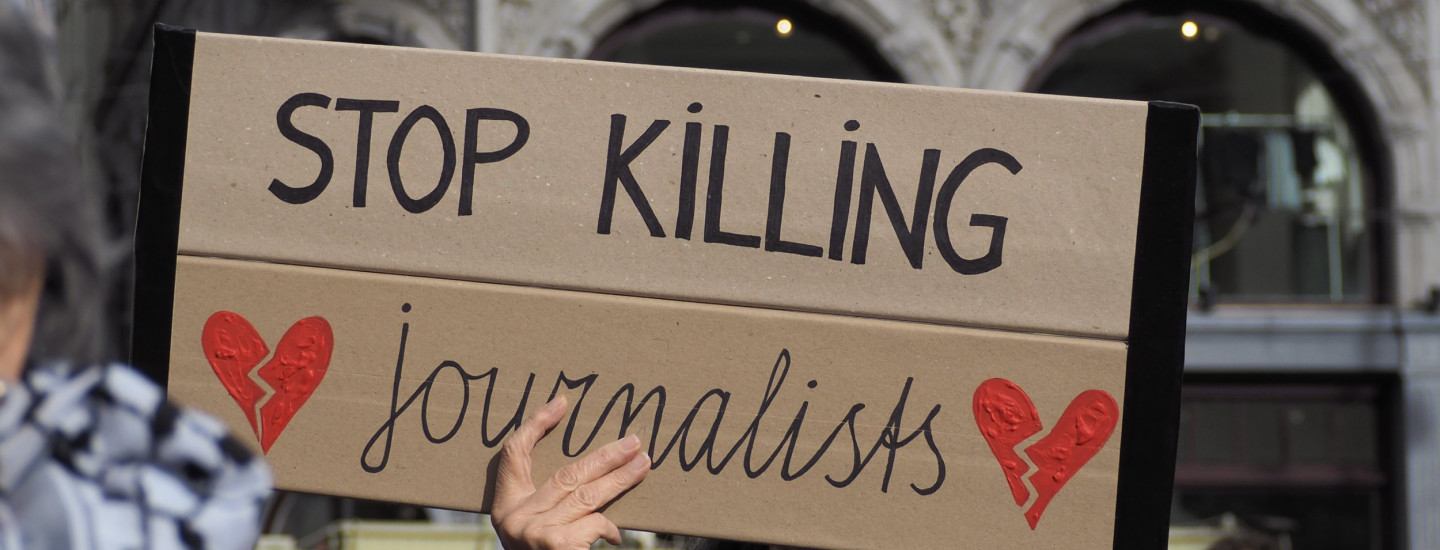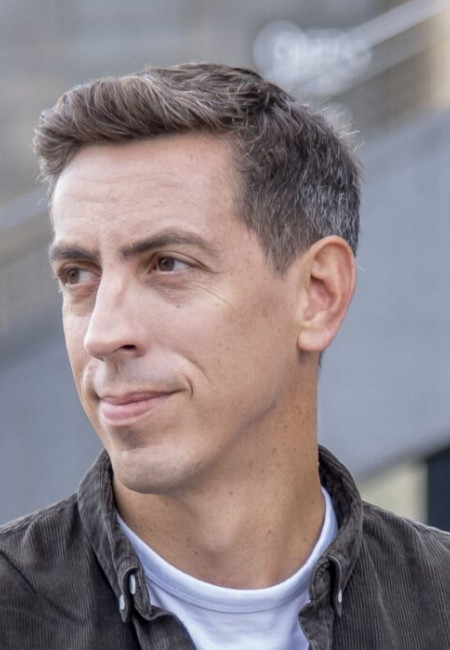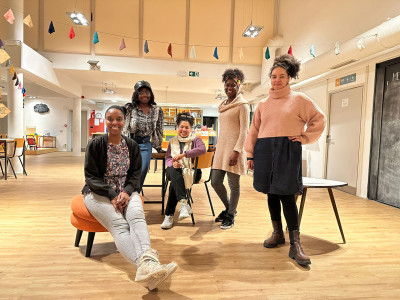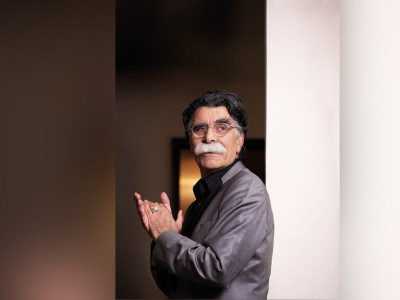
Locatie
Foyer Theaterzaal (De Vooruit)
Datum & Tijd
13 december 15:15 - 16:30
Info
Engels gesproken
Toegankelijkheid
Je begrijpt of spreekt nog niet veel Nederlands.
Je begrijpt al een beetje Nederlands maar je spreekt het nog niet zo goed.
Je begrijpt vrij veel Nederlands en kan ook iets vertellen.
Je begrijpt veel Nederlands en spreekt het goed.
Forbidden Stories [EN]
Gesprek met Laurent Richard, oprichter van Forbidden Stories.
Geweld tegen journalisten neemt wereldwijd toe. Sinds 1992 zijn meer dan 1400 journalisten vermoord, en met het geweld in Palestina neemt dit aantal alleen maar toe. Welk risico nemen journalisten als zij verhalen naar buiten brengen? En draagt iedereen evenveel risico met zich mee. Welke rollen spelen privileges in dit verhaal? Met Forbidden Stories, een internationaal netwerk van journalisten, hebben ze het doel om het werk van vermoorde, of gevangengenomen journalisten voort te zetten.
Laurent Richard werkte 25 jaar lang als documentairemaker voor de Franse televisie. Hij was aanwezig in het gebouw kort na de aanslag op Charlie Hebdo in Parijs — zijn kantoor bevond zich op dezelfde verdieping als de redactie. Hij bracht de laatste minuten door met enkele van de slachtoffers. Deze gebeurtenis bracht hem ertoe in 2017 Forbidden Stories op te richten. Slechts drie weken na de lancering werd de Maltese onderzoeksjournalist Daphne Caruana Galizia vermoord met een autobom. Daphne werd al jaren bedreigd omdat ze corruptie op hoog niveau aan de kaak stelde. In reactie daarop startte Forbidden Stories samen met 45 journalisten van 18 nieuwsorganisaties het Daphne Project. Een half jaar lang werkten ze in het geheim aan het voortzetten van haar onderzoek. Ze namen grote risico’s: de opdrachtgever van haar moord liep immers nog vrij rond. In 2018 werd het project wereldwijd gepubliceerd.
“Veel van de vermoorde journalisten hebben iets gemeen, ze leven vaak zeer geïsoleerd.”
Forbidden Stories wil die isolatie doorbreken en een wereldwijd netwerk creëren. Maar dat is niet eenvoudig: journalisten overtuigen om hun onderzoek te delen is een uitdaging. Ze zijn vaak getraind als lone wolves.
Apache-coördinator Anneleen Ophoff gaat in gesprek met Laurent Richard over zijn werk bij Forbidden Stories, en over de risico’s en uitdagingen waarmee journalisten wereldwijd worden geconfronteerd.
Violence against journalists is increasing worldwide. Since 1992, more than 1,400 journalists have been killed, and with the violence in Palestine, this number continues to rise. What risk do journalists take when they report stories? And does everyone bear the same risk? What role does privilege play in this story? With Forbidden Stories, an international network of journalists, they aim to continue the work of murdered or imprisoned journalists.
Laurent Richard worked for 25 years as a documentary filmmaker for French television. He was present in the building shortly after the attack on Charlie Hebdo in Paris—his office was on the same floor as the editorial office. He spent the last minutes with some of the victims. This event led him to found Forbidden Stories in 2017. Just three weeks after its launch, Maltese investigative journalist Daphne Caruana Galizia was assassinated by a car bomb. Daphne had been threatened for years for exposing high-level corruption. In response, Forbidden Stories, along with 45 journalists from 18 news organizations, launched the Daphne Project. For six months, they worked secretly to continue her investigation. They took significant risks: after all, the person who ordered her murder was still at large. The project was published worldwide in 2018.
"Many of the murdered journalists have something in common: they often live very isolated lives."
Forbidden Stories aims to break that isolation and create a global network. But that's not easy: convincing journalists to share their research is a challenge. They are often trained as lone wolves.
Apache coordinator Anneleen Ophoff talks with Laurent Richard about his work at Forbidden Stories and the risks and challenges facing journalists worldwide.
Laurent Richard
Laurent Richard is an investigative journalist, an Emmy-winning documentary producer, and the founder of Forbidden Stories.
At Forbidden Stories, Laurent oversees and coordinates the global network of partners with the support of a 25-person team. He identifies new avenues for editorial development, envisions paths for structural and impact-driven growth, and represents the organization to donors, the general public, and the media.
Laurent has been conducting international investigations and reporting for television for over 25 years. At the age of 25, he traveled to the Kashmir Valley to report on the conflict between India and Pakistan, as well as to Palestine at the start of the Second Intifada. In 2004, he produced a major investigation for French public television on the Iraq War.
Laurent is also the author of numerous investigations into the lies of the tobacco industry, abuses in the financial sector, human rights violations in Central Asia, threats against Indigenous peoples in the Brazilian Amazon, and the clandestine operations of Mossad and the CIA.
In 2011, he co-founded Cash Investigation, the most well-known investigative show broadcast on French public television (France 2).
The terrorist attack on January 7, 2015, against the journalists and cartoonists of Charlie Hebdo changed his life. The victims were his office neighbors. Arriving at the scene shortly after the terrorists had left the building, Laurent and his colleagues at “Premières Lignes” helped the survivors. Around the same time, several foreign journalists he knew were imprisoned abroad under dictatorial regimes. These events, occurring within the same period, inspired and strengthened his resolve to create a global network of journalists dedicated to continuing the investigations of reporters who had been killed, imprisoned, or threatened.
Following the events of 2015, Laurent proposed this project to the University of Michigan, which awarded him a one-year fellowship. From 2016 to 2017, Laurent laid the foundations for Forbidden Stories and also created the SafeBox Network, a secure digital vault allowing threatened journalists to safeguard their ongoing investigations. If they were prevented from publishing, their work would continue.
The first investigation coordinated by Forbidden Stories was The Daphne Project, published in June 2018, several months after the assassination of Daphne Caruana Galizia. The Daphne Project brought together 45 journalists and 18 media organizations, including The New York Times in the United States and Le Monde in France. The organization’s message is clear: “You killed the messenger, but you won’t kill the message.”
Since its creation, Forbidden Stories has relied on a network of 300 journalists and 90 media organizations worldwide. The organization has continued the work of murdered journalists in India, Mexico, Ghana, Colombia, Brazil, and more than a dozen other countries. Forbidden Stories and its partners have received numerous awards, including the prestigious European Press Prize, two George Polk Awards, and the RSF Impact Prize for The Pegasus Project, published in 2021.
Laurent Richard has spoken before numerous institutions in France and across Europe, as well as on the campuses of Harvard, Columbia, and Yale. He was named European Journalist of the Year at the Prix Europa in Berlin in 2018. He is also the co-author of Pegasus: How a Spy in Our Pocket Threatens the End of Privacy, Dignity, and Democracy, published in 2023. For the same investigation into the Pegasus spyware, he received an Emmy Award in October 2024 for the PBS Frontline documentary in the category of Outstanding Investigative Documentary.
Laurent is also an Ashoka Fellow, part of an international organization that brings together a community of innovative social entrepreneurs.
Anneleen Ophoff
[EN] Anneleen Ophoff has worked in journalism for over ten years. First at the Vranckx editorial team at VRT NWS, then as a freelancer for national and international media. She has created documentaries, long reads, interactive infographics, and online video series, but ultimately, she loves the smell of a freshly printed magazine most. Since May 2025, she has been the Apache coordinator. She has a passion for stories about and for the queer community and has worked on several investigations into land rights and the rights of indigenous peoples.
[NL] Anneleen Ophoff werkt al meer dan tien jaar in de journalistiek. Eerst bij de Vranckx-redactie van VRT NWS, daarna als freelancer voor binnen- en buitenlandse media. Ze maakte documentaires, longreads, interactieve infografieken en online videoreeksen, maar houdt uiteindelijk toch het meest van de geur van een vers gedrukt magazine. Sinds mei 2025 is ze coördinator Apache. Ze heeft een voorliefde voor verhalen over en voor de queer gemeenschap en werkte aan meerdere onderzoeken rond landrechten en de rechten van inheemse volkeren.

-Jan-Steiger.jpg/a7965ea19a5979dbfd50f120f58c763b.jpg)


Vince-Fleming.jpg/6cc1d00c9883f471256dfee86f68296a.jpg)